Evaluation of Clinical Issue: Religious Objection to Blood Transfusion
VerifiedAdded on 2021/02/19
|11
|3325
|25
Report
AI Summary
This report delves into the clinical issue of religious objections to blood transfusions, a significant challenge in healthcare settings. It examines the background, analyzing the influence of religious and cultural beliefs on patient decisions regarding blood transfusions. The analysis explores cultural safety variables, ethical considerations, and legal aspects, including patient rights and the responsibilities of healthcare professionals. The report evaluates the evidence related to this issue and its effects on culturally respectful clinical practice, highlighting the need for understanding and sensitivity. It provides recommendations for addressing religious objections, including legal frameworks, educational initiatives, and strategies to promote informed consent and shared decision-making. The report emphasizes the importance of balancing patient autonomy with the ethical duty to provide effective medical care. The report concludes by underscoring the need for healthcare organizations to develop policies that respect religious beliefs while ensuring patient safety and well-being.
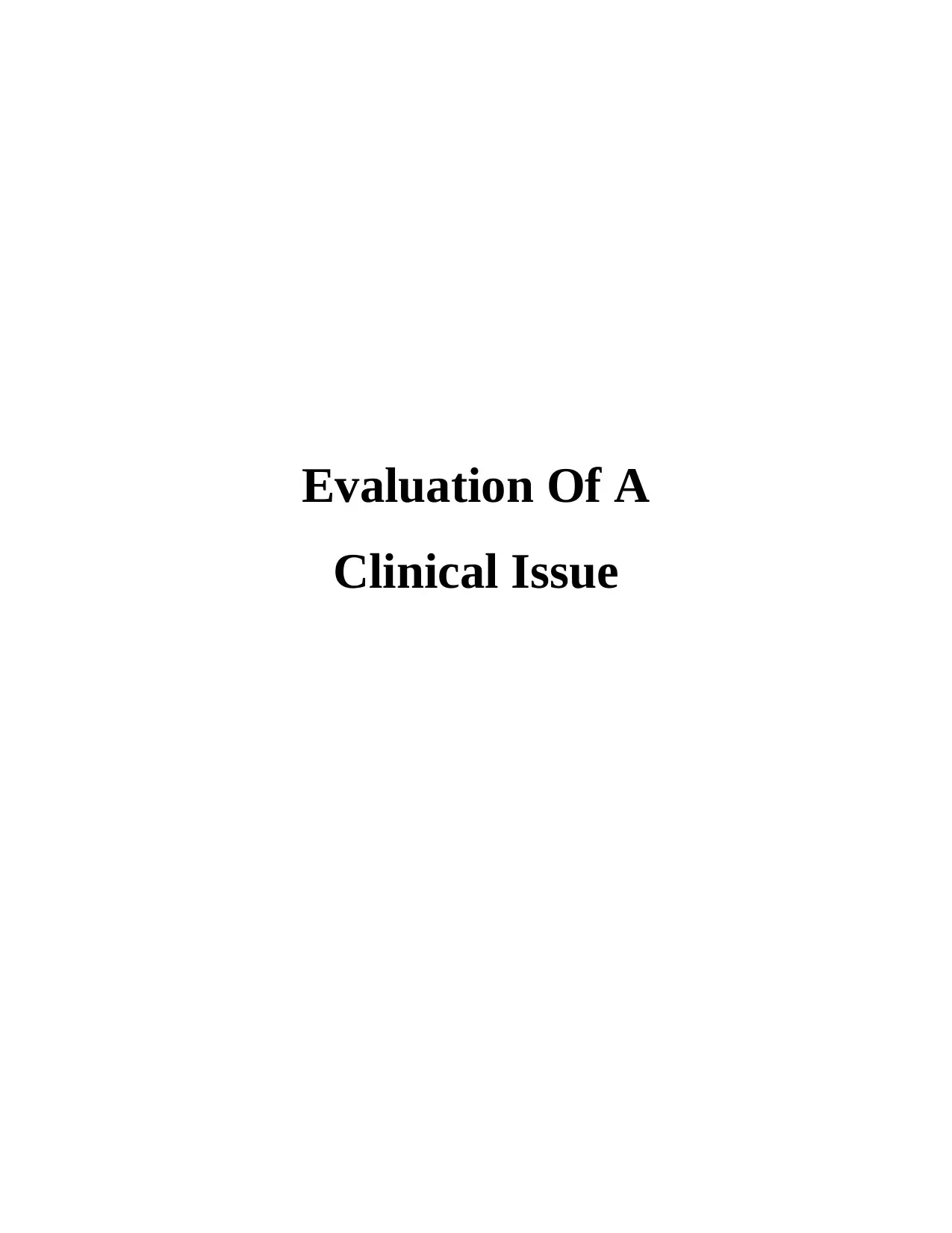
Evaluation Of A
Clinical Issue
Clinical Issue
Paraphrase This Document
Need a fresh take? Get an instant paraphrase of this document with our AI Paraphraser
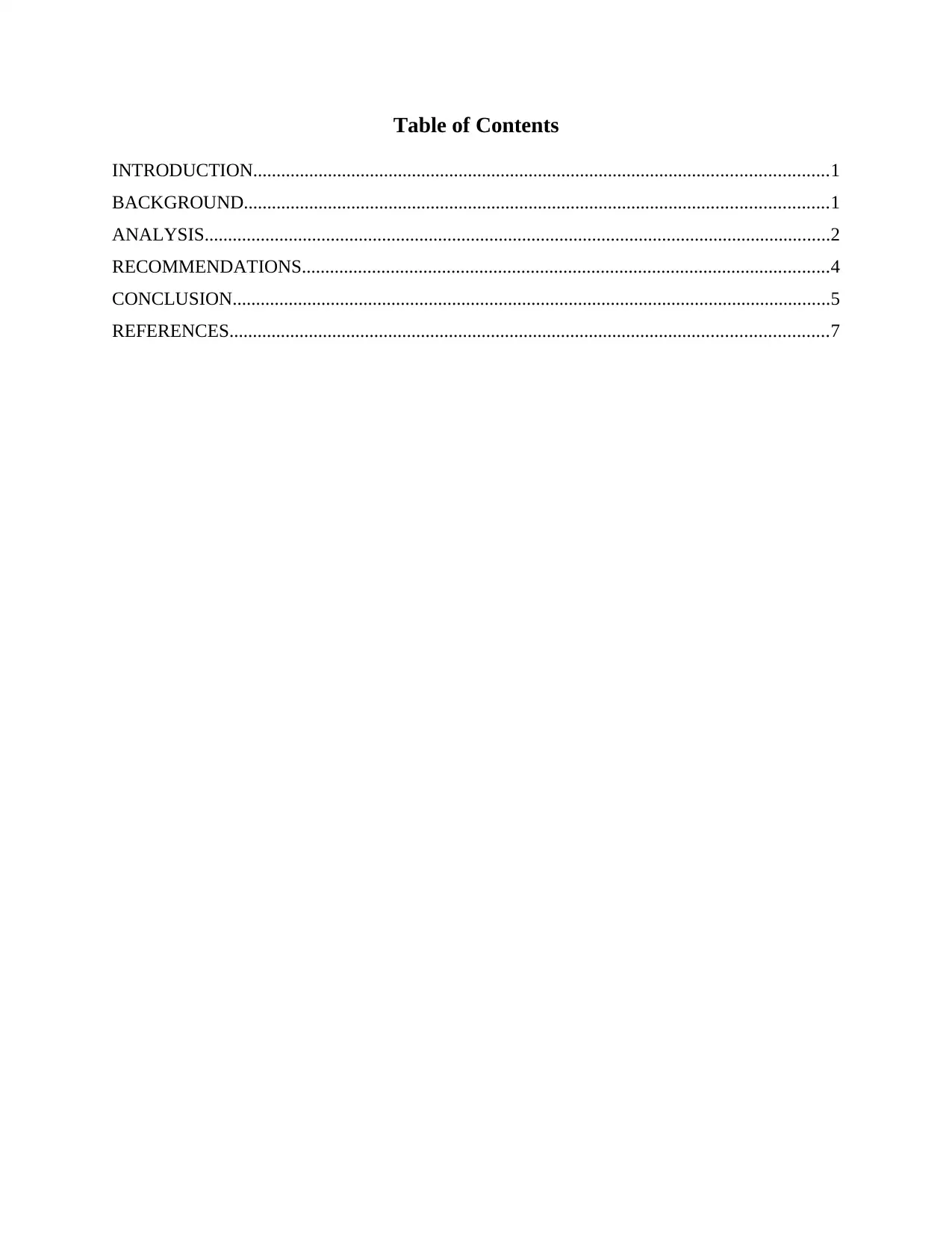
Table of Contents
INTRODUCTION...........................................................................................................................1
BACKGROUND.............................................................................................................................1
ANALYSIS......................................................................................................................................2
RECOMMENDATIONS.................................................................................................................4
CONCLUSION................................................................................................................................5
REFERENCES................................................................................................................................7
INTRODUCTION...........................................................................................................................1
BACKGROUND.............................................................................................................................1
ANALYSIS......................................................................................................................................2
RECOMMENDATIONS.................................................................................................................4
CONCLUSION................................................................................................................................5
REFERENCES................................................................................................................................7

⊘ This is a preview!⊘
Do you want full access?
Subscribe today to unlock all pages.

Trusted by 1+ million students worldwide
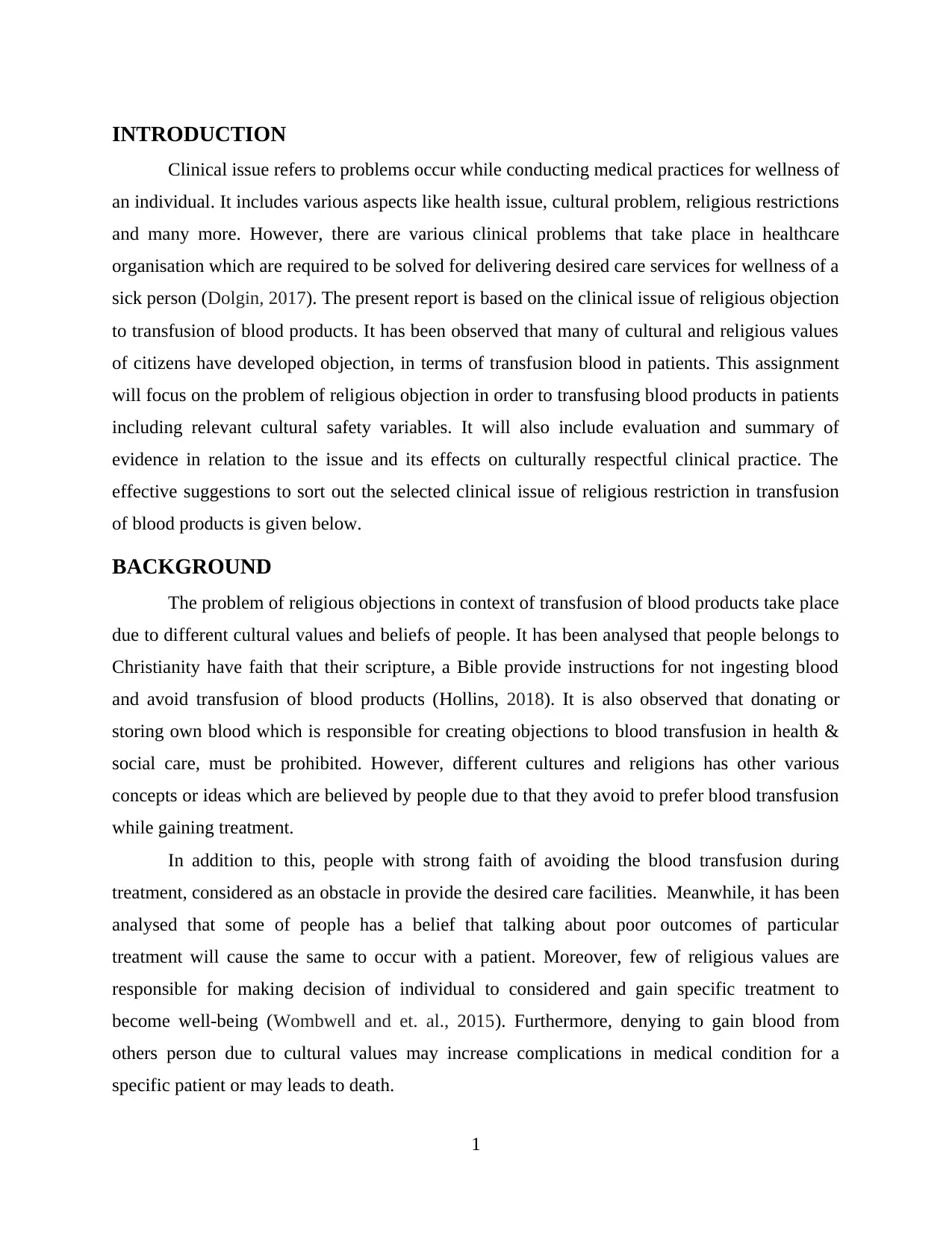
INTRODUCTION
Clinical issue refers to problems occur while conducting medical practices for wellness of
an individual. It includes various aspects like health issue, cultural problem, religious restrictions
and many more. However, there are various clinical problems that take place in healthcare
organisation which are required to be solved for delivering desired care services for wellness of a
sick person (Dolgin, 2017). The present report is based on the clinical issue of religious objection
to transfusion of blood products. It has been observed that many of cultural and religious values
of citizens have developed objection, in terms of transfusion blood in patients. This assignment
will focus on the problem of religious objection in order to transfusing blood products in patients
including relevant cultural safety variables. It will also include evaluation and summary of
evidence in relation to the issue and its effects on culturally respectful clinical practice. The
effective suggestions to sort out the selected clinical issue of religious restriction in transfusion
of blood products is given below.
BACKGROUND
The problem of religious objections in context of transfusion of blood products take place
due to different cultural values and beliefs of people. It has been analysed that people belongs to
Christianity have faith that their scripture, a Bible provide instructions for not ingesting blood
and avoid transfusion of blood products (Hollins, 2018). It is also observed that donating or
storing own blood which is responsible for creating objections to blood transfusion in health &
social care, must be prohibited. However, different cultures and religions has other various
concepts or ideas which are believed by people due to that they avoid to prefer blood transfusion
while gaining treatment.
In addition to this, people with strong faith of avoiding the blood transfusion during
treatment, considered as an obstacle in provide the desired care facilities. Meanwhile, it has been
analysed that some of people has a belief that talking about poor outcomes of particular
treatment will cause the same to occur with a patient. Moreover, few of religious values are
responsible for making decision of individual to considered and gain specific treatment to
become well-being (Wombwell and et. al., 2015). Furthermore, denying to gain blood from
others person due to cultural values may increase complications in medical condition for a
specific patient or may leads to death.
1
Clinical issue refers to problems occur while conducting medical practices for wellness of
an individual. It includes various aspects like health issue, cultural problem, religious restrictions
and many more. However, there are various clinical problems that take place in healthcare
organisation which are required to be solved for delivering desired care services for wellness of a
sick person (Dolgin, 2017). The present report is based on the clinical issue of religious objection
to transfusion of blood products. It has been observed that many of cultural and religious values
of citizens have developed objection, in terms of transfusion blood in patients. This assignment
will focus on the problem of religious objection in order to transfusing blood products in patients
including relevant cultural safety variables. It will also include evaluation and summary of
evidence in relation to the issue and its effects on culturally respectful clinical practice. The
effective suggestions to sort out the selected clinical issue of religious restriction in transfusion
of blood products is given below.
BACKGROUND
The problem of religious objections in context of transfusion of blood products take place
due to different cultural values and beliefs of people. It has been analysed that people belongs to
Christianity have faith that their scripture, a Bible provide instructions for not ingesting blood
and avoid transfusion of blood products (Hollins, 2018). It is also observed that donating or
storing own blood which is responsible for creating objections to blood transfusion in health &
social care, must be prohibited. However, different cultures and religions has other various
concepts or ideas which are believed by people due to that they avoid to prefer blood transfusion
while gaining treatment.
In addition to this, people with strong faith of avoiding the blood transfusion during
treatment, considered as an obstacle in provide the desired care facilities. Meanwhile, it has been
analysed that some of people has a belief that talking about poor outcomes of particular
treatment will cause the same to occur with a patient. Moreover, few of religious values are
responsible for making decision of individual to considered and gain specific treatment to
become well-being (Wombwell and et. al., 2015). Furthermore, denying to gain blood from
others person due to cultural values may increase complications in medical condition for a
specific patient or may leads to death.
1
Paraphrase This Document
Need a fresh take? Get an instant paraphrase of this document with our AI Paraphraser
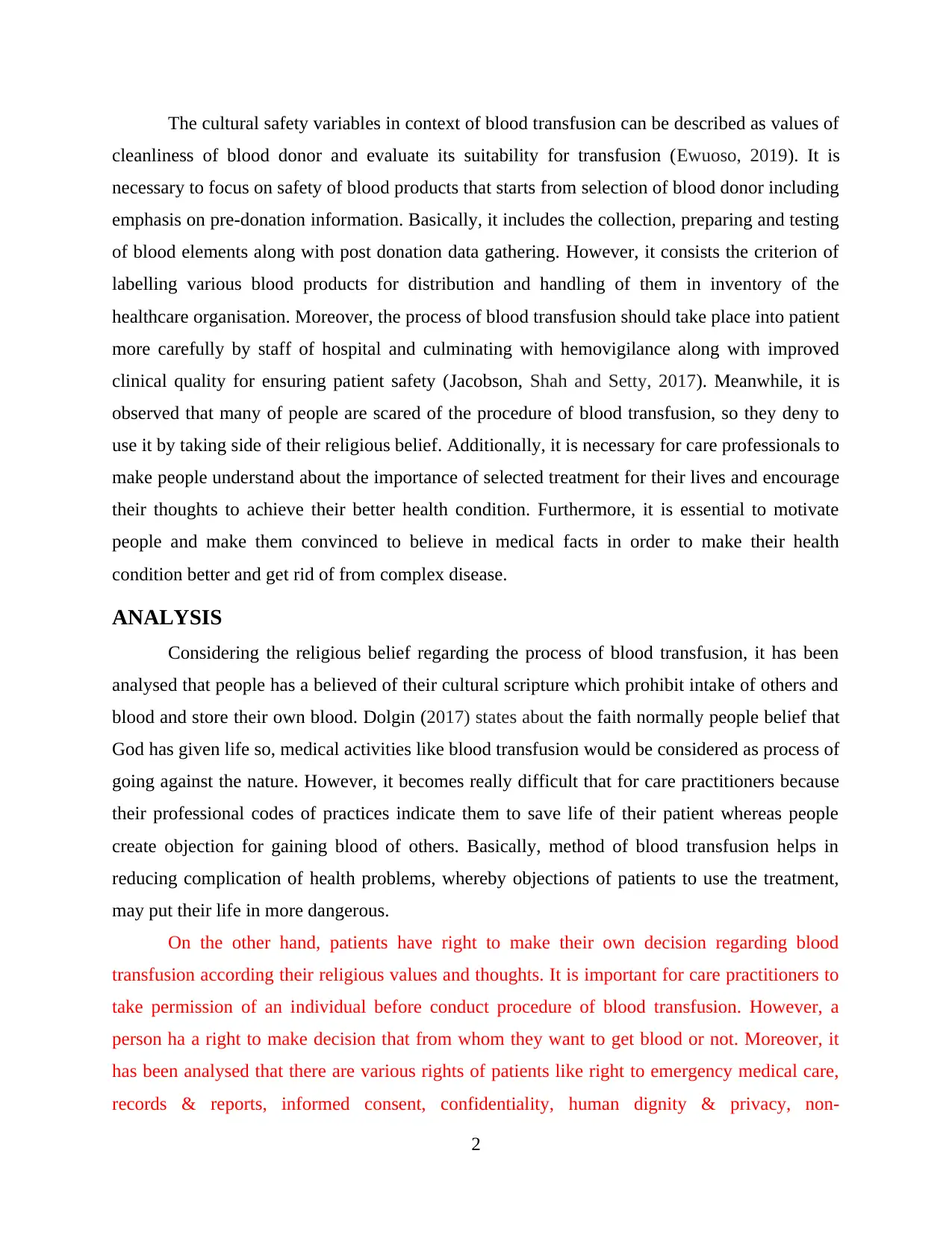
The cultural safety variables in context of blood transfusion can be described as values of
cleanliness of blood donor and evaluate its suitability for transfusion (Ewuoso, 2019). It is
necessary to focus on safety of blood products that starts from selection of blood donor including
emphasis on pre-donation information. Basically, it includes the collection, preparing and testing
of blood elements along with post donation data gathering. However, it consists the criterion of
labelling various blood products for distribution and handling of them in inventory of the
healthcare organisation. Moreover, the process of blood transfusion should take place into patient
more carefully by staff of hospital and culminating with hemovigilance along with improved
clinical quality for ensuring patient safety (Jacobson, Shah and Setty, 2017). Meanwhile, it is
observed that many of people are scared of the procedure of blood transfusion, so they deny to
use it by taking side of their religious belief. Additionally, it is necessary for care professionals to
make people understand about the importance of selected treatment for their lives and encourage
their thoughts to achieve their better health condition. Furthermore, it is essential to motivate
people and make them convinced to believe in medical facts in order to make their health
condition better and get rid of from complex disease.
ANALYSIS
Considering the religious belief regarding the process of blood transfusion, it has been
analysed that people has a believed of their cultural scripture which prohibit intake of others and
blood and store their own blood. Dolgin (2017) states about the faith normally people belief that
God has given life so, medical activities like blood transfusion would be considered as process of
going against the nature. However, it becomes really difficult that for care practitioners because
their professional codes of practices indicate them to save life of their patient whereas people
create objection for gaining blood of others. Basically, method of blood transfusion helps in
reducing complication of health problems, whereby objections of patients to use the treatment,
may put their life in more dangerous.
On the other hand, patients have right to make their own decision regarding blood
transfusion according their religious values and thoughts. It is important for care practitioners to
take permission of an individual before conduct procedure of blood transfusion. However, a
person ha a right to make decision that from whom they want to get blood or not. Moreover, it
has been analysed that there are various rights of patients like right to emergency medical care,
records & reports, informed consent, confidentiality, human dignity & privacy, non-
2
cleanliness of blood donor and evaluate its suitability for transfusion (Ewuoso, 2019). It is
necessary to focus on safety of blood products that starts from selection of blood donor including
emphasis on pre-donation information. Basically, it includes the collection, preparing and testing
of blood elements along with post donation data gathering. However, it consists the criterion of
labelling various blood products for distribution and handling of them in inventory of the
healthcare organisation. Moreover, the process of blood transfusion should take place into patient
more carefully by staff of hospital and culminating with hemovigilance along with improved
clinical quality for ensuring patient safety (Jacobson, Shah and Setty, 2017). Meanwhile, it is
observed that many of people are scared of the procedure of blood transfusion, so they deny to
use it by taking side of their religious belief. Additionally, it is necessary for care professionals to
make people understand about the importance of selected treatment for their lives and encourage
their thoughts to achieve their better health condition. Furthermore, it is essential to motivate
people and make them convinced to believe in medical facts in order to make their health
condition better and get rid of from complex disease.
ANALYSIS
Considering the religious belief regarding the process of blood transfusion, it has been
analysed that people has a believed of their cultural scripture which prohibit intake of others and
blood and store their own blood. Dolgin (2017) states about the faith normally people belief that
God has given life so, medical activities like blood transfusion would be considered as process of
going against the nature. However, it becomes really difficult that for care practitioners because
their professional codes of practices indicate them to save life of their patient whereas people
create objection for gaining blood of others. Basically, method of blood transfusion helps in
reducing complication of health problems, whereby objections of patients to use the treatment,
may put their life in more dangerous.
On the other hand, patients have right to make their own decision regarding blood
transfusion according their religious values and thoughts. It is important for care practitioners to
take permission of an individual before conduct procedure of blood transfusion. However, a
person ha a right to make decision that from whom they want to get blood or not. Moreover, it
has been analysed that there are various rights of patients like right to emergency medical care,
records & reports, informed consent, confidentiality, human dignity & privacy, non-
2
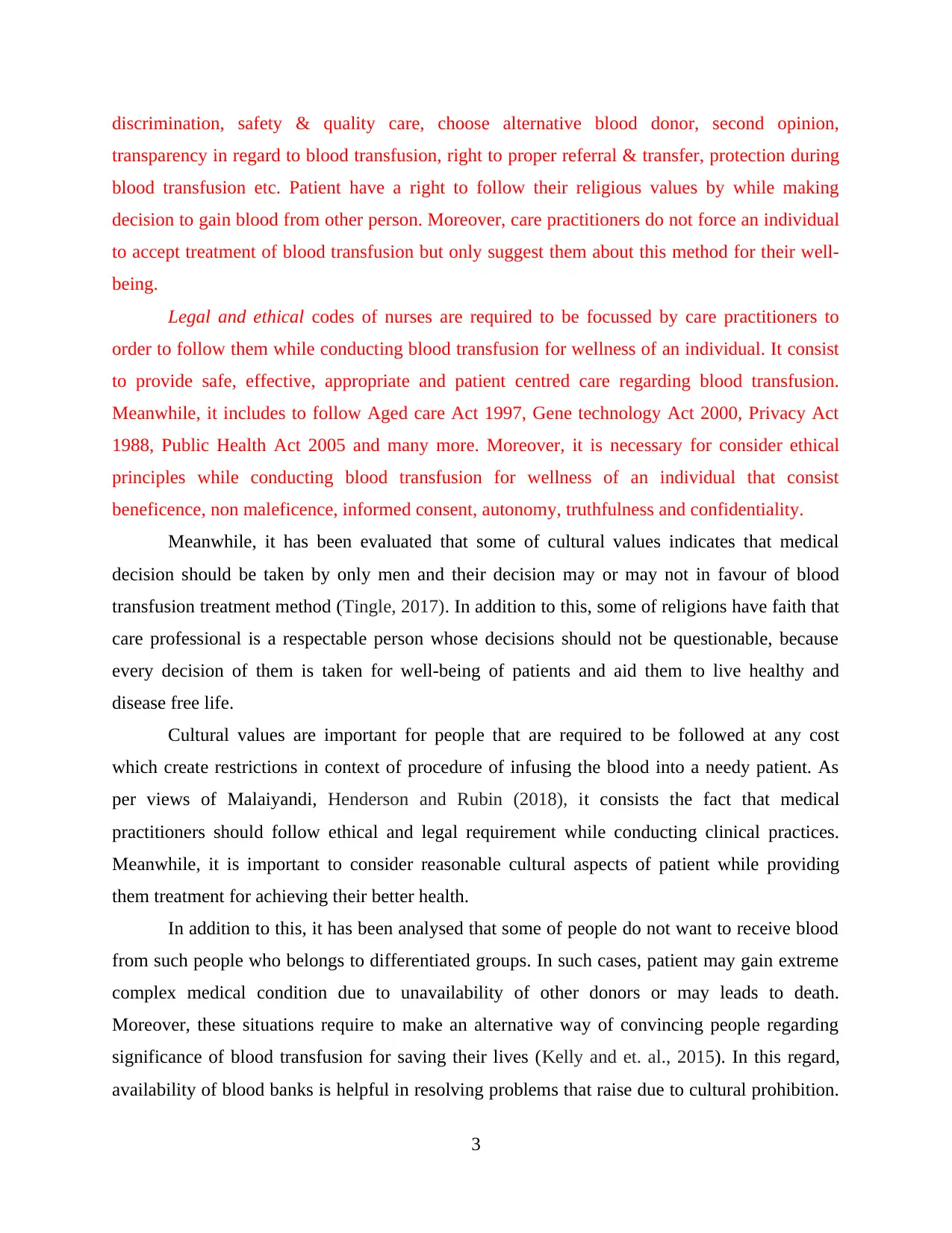
discrimination, safety & quality care, choose alternative blood donor, second opinion,
transparency in regard to blood transfusion, right to proper referral & transfer, protection during
blood transfusion etc. Patient have a right to follow their religious values by while making
decision to gain blood from other person. Moreover, care practitioners do not force an individual
to accept treatment of blood transfusion but only suggest them about this method for their well-
being.
Legal and ethical codes of nurses are required to be focussed by care practitioners to
order to follow them while conducting blood transfusion for wellness of an individual. It consist
to provide safe, effective, appropriate and patient centred care regarding blood transfusion.
Meanwhile, it includes to follow Aged care Act 1997, Gene technology Act 2000, Privacy Act
1988, Public Health Act 2005 and many more. Moreover, it is necessary for consider ethical
principles while conducting blood transfusion for wellness of an individual that consist
beneficence, non maleficence, informed consent, autonomy, truthfulness and confidentiality.
Meanwhile, it has been evaluated that some of cultural values indicates that medical
decision should be taken by only men and their decision may or may not in favour of blood
transfusion treatment method (Tingle, 2017). In addition to this, some of religions have faith that
care professional is a respectable person whose decisions should not be questionable, because
every decision of them is taken for well-being of patients and aid them to live healthy and
disease free life.
Cultural values are important for people that are required to be followed at any cost
which create restrictions in context of procedure of infusing the blood into a needy patient. As
per views of Malaiyandi, Henderson and Rubin (2018), it consists the fact that medical
practitioners should follow ethical and legal requirement while conducting clinical practices.
Meanwhile, it is important to consider reasonable cultural aspects of patient while providing
them treatment for achieving their better health.
In addition to this, it has been analysed that some of people do not want to receive blood
from such people who belongs to differentiated groups. In such cases, patient may gain extreme
complex medical condition due to unavailability of other donors or may leads to death.
Moreover, these situations require to make an alternative way of convincing people regarding
significance of blood transfusion for saving their lives (Kelly and et. al., 2015). In this regard,
availability of blood banks is helpful in resolving problems that raise due to cultural prohibition.
3
transparency in regard to blood transfusion, right to proper referral & transfer, protection during
blood transfusion etc. Patient have a right to follow their religious values by while making
decision to gain blood from other person. Moreover, care practitioners do not force an individual
to accept treatment of blood transfusion but only suggest them about this method for their well-
being.
Legal and ethical codes of nurses are required to be focussed by care practitioners to
order to follow them while conducting blood transfusion for wellness of an individual. It consist
to provide safe, effective, appropriate and patient centred care regarding blood transfusion.
Meanwhile, it includes to follow Aged care Act 1997, Gene technology Act 2000, Privacy Act
1988, Public Health Act 2005 and many more. Moreover, it is necessary for consider ethical
principles while conducting blood transfusion for wellness of an individual that consist
beneficence, non maleficence, informed consent, autonomy, truthfulness and confidentiality.
Meanwhile, it has been evaluated that some of cultural values indicates that medical
decision should be taken by only men and their decision may or may not in favour of blood
transfusion treatment method (Tingle, 2017). In addition to this, some of religions have faith that
care professional is a respectable person whose decisions should not be questionable, because
every decision of them is taken for well-being of patients and aid them to live healthy and
disease free life.
Cultural values are important for people that are required to be followed at any cost
which create restrictions in context of procedure of infusing the blood into a needy patient. As
per views of Malaiyandi, Henderson and Rubin (2018), it consists the fact that medical
practitioners should follow ethical and legal requirement while conducting clinical practices.
Meanwhile, it is important to consider reasonable cultural aspects of patient while providing
them treatment for achieving their better health.
In addition to this, it has been analysed that some of people do not want to receive blood
from such people who belongs to differentiated groups. In such cases, patient may gain extreme
complex medical condition due to unavailability of other donors or may leads to death.
Moreover, these situations require to make an alternative way of convincing people regarding
significance of blood transfusion for saving their lives (Kelly and et. al., 2015). In this regard,
availability of blood banks is helpful in resolving problems that raise due to cultural prohibition.
3
⊘ This is a preview!⊘
Do you want full access?
Subscribe today to unlock all pages.

Trusted by 1+ million students worldwide
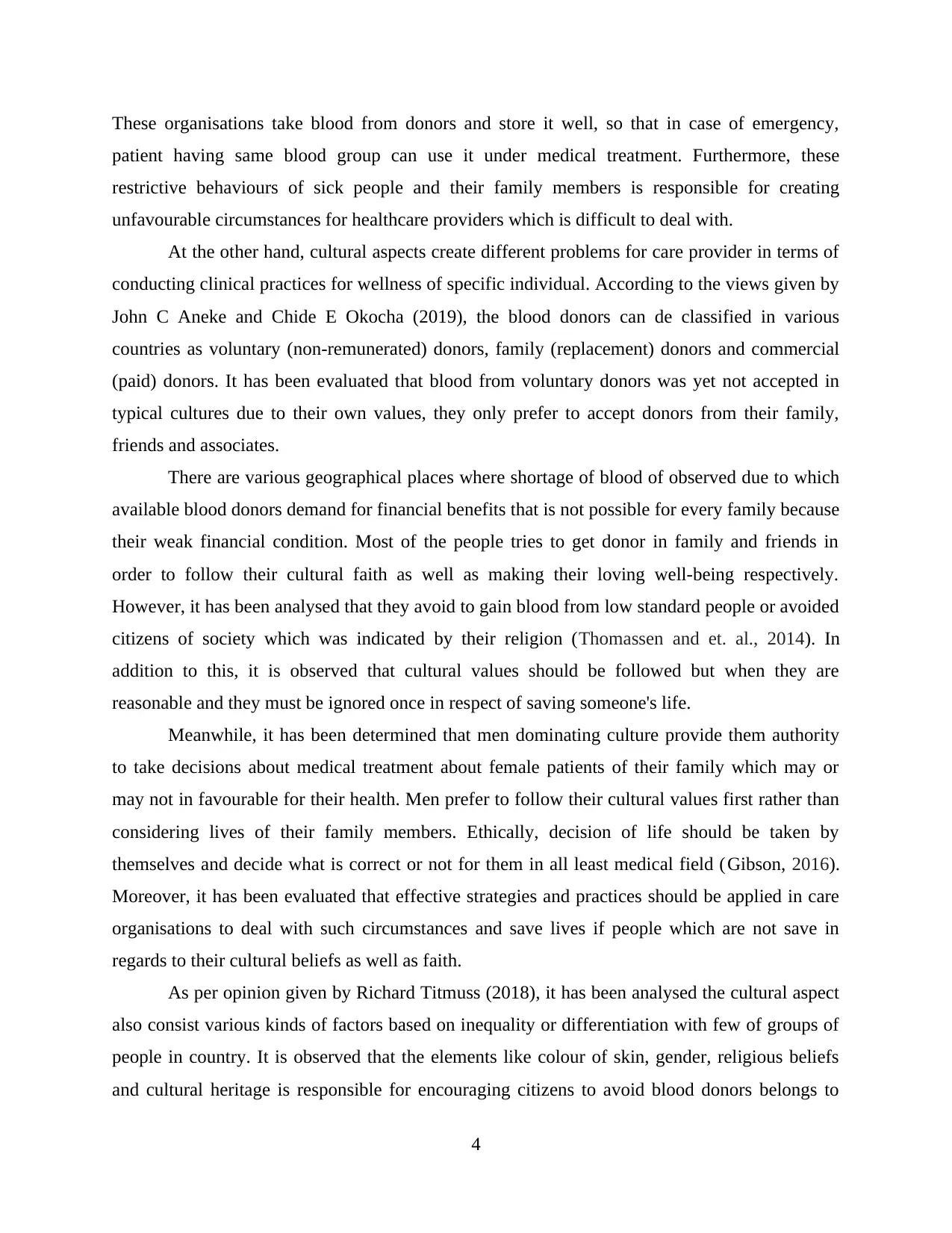
These organisations take blood from donors and store it well, so that in case of emergency,
patient having same blood group can use it under medical treatment. Furthermore, these
restrictive behaviours of sick people and their family members is responsible for creating
unfavourable circumstances for healthcare providers which is difficult to deal with.
At the other hand, cultural aspects create different problems for care provider in terms of
conducting clinical practices for wellness of specific individual. According to the views given by
John C Aneke and Chide E Okocha (2019), the blood donors can de classified in various
countries as voluntary (non-remunerated) donors, family (replacement) donors and commercial
(paid) donors. It has been evaluated that blood from voluntary donors was yet not accepted in
typical cultures due to their own values, they only prefer to accept donors from their family,
friends and associates.
There are various geographical places where shortage of blood of observed due to which
available blood donors demand for financial benefits that is not possible for every family because
their weak financial condition. Most of the people tries to get donor in family and friends in
order to follow their cultural faith as well as making their loving well-being respectively.
However, it has been analysed that they avoid to gain blood from low standard people or avoided
citizens of society which was indicated by their religion (Thomassen and et. al., 2014). In
addition to this, it is observed that cultural values should be followed but when they are
reasonable and they must be ignored once in respect of saving someone's life.
Meanwhile, it has been determined that men dominating culture provide them authority
to take decisions about medical treatment about female patients of their family which may or
may not in favourable for their health. Men prefer to follow their cultural values first rather than
considering lives of their family members. Ethically, decision of life should be taken by
themselves and decide what is correct or not for them in all least medical field (Gibson, 2016).
Moreover, it has been evaluated that effective strategies and practices should be applied in care
organisations to deal with such circumstances and save lives if people which are not save in
regards to their cultural beliefs as well as faith.
As per opinion given by Richard Titmuss (2018), it has been analysed the cultural aspect
also consist various kinds of factors based on inequality or differentiation with few of groups of
people in country. It is observed that the elements like colour of skin, gender, religious beliefs
and cultural heritage is responsible for encouraging citizens to avoid blood donors belongs to
4
patient having same blood group can use it under medical treatment. Furthermore, these
restrictive behaviours of sick people and their family members is responsible for creating
unfavourable circumstances for healthcare providers which is difficult to deal with.
At the other hand, cultural aspects create different problems for care provider in terms of
conducting clinical practices for wellness of specific individual. According to the views given by
John C Aneke and Chide E Okocha (2019), the blood donors can de classified in various
countries as voluntary (non-remunerated) donors, family (replacement) donors and commercial
(paid) donors. It has been evaluated that blood from voluntary donors was yet not accepted in
typical cultures due to their own values, they only prefer to accept donors from their family,
friends and associates.
There are various geographical places where shortage of blood of observed due to which
available blood donors demand for financial benefits that is not possible for every family because
their weak financial condition. Most of the people tries to get donor in family and friends in
order to follow their cultural faith as well as making their loving well-being respectively.
However, it has been analysed that they avoid to gain blood from low standard people or avoided
citizens of society which was indicated by their religion (Thomassen and et. al., 2014). In
addition to this, it is observed that cultural values should be followed but when they are
reasonable and they must be ignored once in respect of saving someone's life.
Meanwhile, it has been determined that men dominating culture provide them authority
to take decisions about medical treatment about female patients of their family which may or
may not in favourable for their health. Men prefer to follow their cultural values first rather than
considering lives of their family members. Ethically, decision of life should be taken by
themselves and decide what is correct or not for them in all least medical field (Gibson, 2016).
Moreover, it has been evaluated that effective strategies and practices should be applied in care
organisations to deal with such circumstances and save lives if people which are not save in
regards to their cultural beliefs as well as faith.
As per opinion given by Richard Titmuss (2018), it has been analysed the cultural aspect
also consist various kinds of factors based on inequality or differentiation with few of groups of
people in country. It is observed that the elements like colour of skin, gender, religious beliefs
and cultural heritage is responsible for encouraging citizens to avoid blood donors belongs to
4
Paraphrase This Document
Need a fresh take? Get an instant paraphrase of this document with our AI Paraphraser
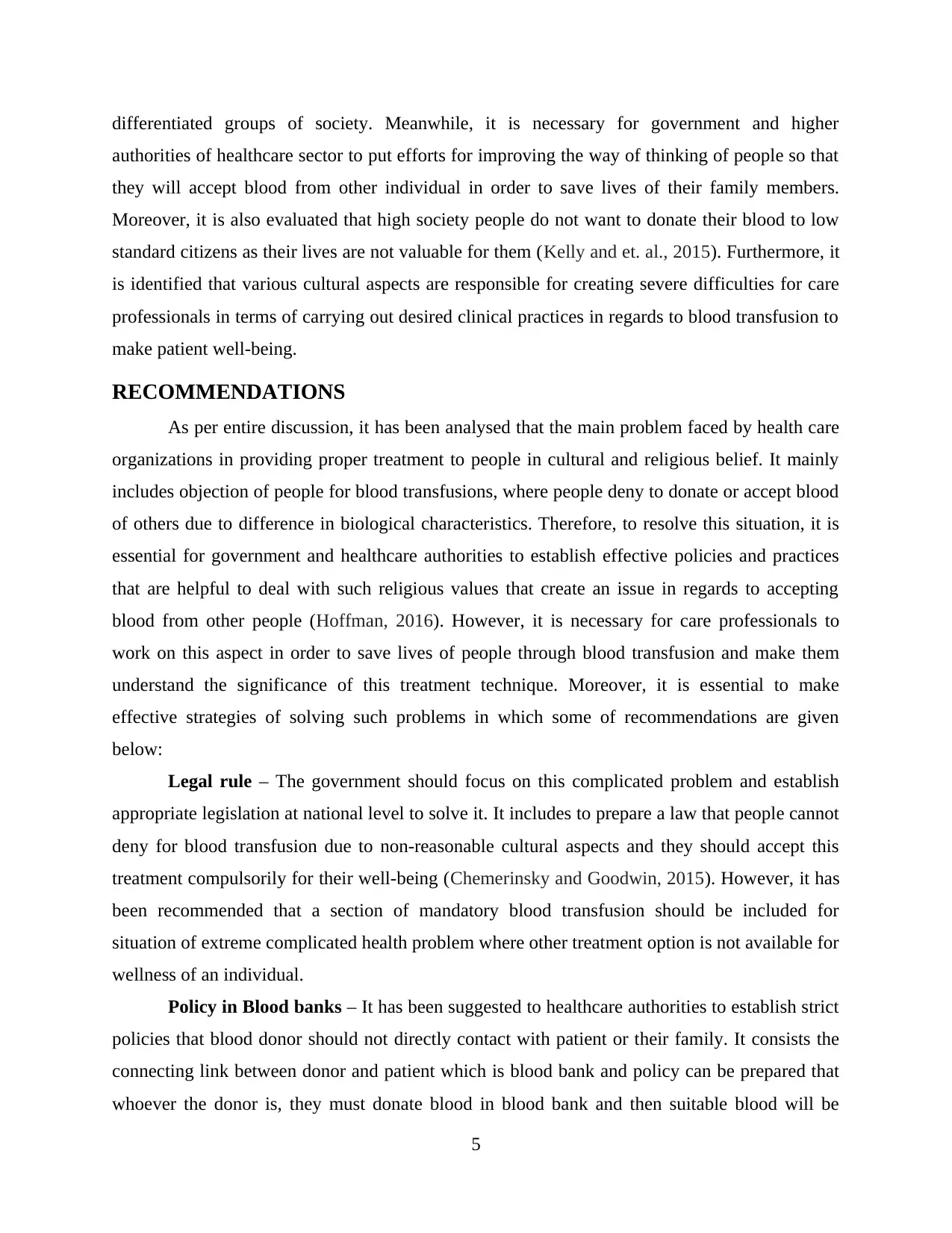
differentiated groups of society. Meanwhile, it is necessary for government and higher
authorities of healthcare sector to put efforts for improving the way of thinking of people so that
they will accept blood from other individual in order to save lives of their family members.
Moreover, it is also evaluated that high society people do not want to donate their blood to low
standard citizens as their lives are not valuable for them (Kelly and et. al., 2015). Furthermore, it
is identified that various cultural aspects are responsible for creating severe difficulties for care
professionals in terms of carrying out desired clinical practices in regards to blood transfusion to
make patient well-being.
RECOMMENDATIONS
As per entire discussion, it has been analysed that the main problem faced by health care
organizations in providing proper treatment to people in cultural and religious belief. It mainly
includes objection of people for blood transfusions, where people deny to donate or accept blood
of others due to difference in biological characteristics. Therefore, to resolve this situation, it is
essential for government and healthcare authorities to establish effective policies and practices
that are helpful to deal with such religious values that create an issue in regards to accepting
blood from other people (Hoffman, 2016). However, it is necessary for care professionals to
work on this aspect in order to save lives of people through blood transfusion and make them
understand the significance of this treatment technique. Moreover, it is essential to make
effective strategies of solving such problems in which some of recommendations are given
below:
Legal rule – The government should focus on this complicated problem and establish
appropriate legislation at national level to solve it. It includes to prepare a law that people cannot
deny for blood transfusion due to non-reasonable cultural aspects and they should accept this
treatment compulsorily for their well-being (Chemerinsky and Goodwin, 2015). However, it has
been recommended that a section of mandatory blood transfusion should be included for
situation of extreme complicated health problem where other treatment option is not available for
wellness of an individual.
Policy in Blood banks – It has been suggested to healthcare authorities to establish strict
policies that blood donor should not directly contact with patient or their family. It consists the
connecting link between donor and patient which is blood bank and policy can be prepared that
whoever the donor is, they must donate blood in blood bank and then suitable blood will be
5
authorities of healthcare sector to put efforts for improving the way of thinking of people so that
they will accept blood from other individual in order to save lives of their family members.
Moreover, it is also evaluated that high society people do not want to donate their blood to low
standard citizens as their lives are not valuable for them (Kelly and et. al., 2015). Furthermore, it
is identified that various cultural aspects are responsible for creating severe difficulties for care
professionals in terms of carrying out desired clinical practices in regards to blood transfusion to
make patient well-being.
RECOMMENDATIONS
As per entire discussion, it has been analysed that the main problem faced by health care
organizations in providing proper treatment to people in cultural and religious belief. It mainly
includes objection of people for blood transfusions, where people deny to donate or accept blood
of others due to difference in biological characteristics. Therefore, to resolve this situation, it is
essential for government and healthcare authorities to establish effective policies and practices
that are helpful to deal with such religious values that create an issue in regards to accepting
blood from other people (Hoffman, 2016). However, it is necessary for care professionals to
work on this aspect in order to save lives of people through blood transfusion and make them
understand the significance of this treatment technique. Moreover, it is essential to make
effective strategies of solving such problems in which some of recommendations are given
below:
Legal rule – The government should focus on this complicated problem and establish
appropriate legislation at national level to solve it. It includes to prepare a law that people cannot
deny for blood transfusion due to non-reasonable cultural aspects and they should accept this
treatment compulsorily for their well-being (Chemerinsky and Goodwin, 2015). However, it has
been recommended that a section of mandatory blood transfusion should be included for
situation of extreme complicated health problem where other treatment option is not available for
wellness of an individual.
Policy in Blood banks – It has been suggested to healthcare authorities to establish strict
policies that blood donor should not directly contact with patient or their family. It consists the
connecting link between donor and patient which is blood bank and policy can be prepared that
whoever the donor is, they must donate blood in blood bank and then suitable blood will be
5
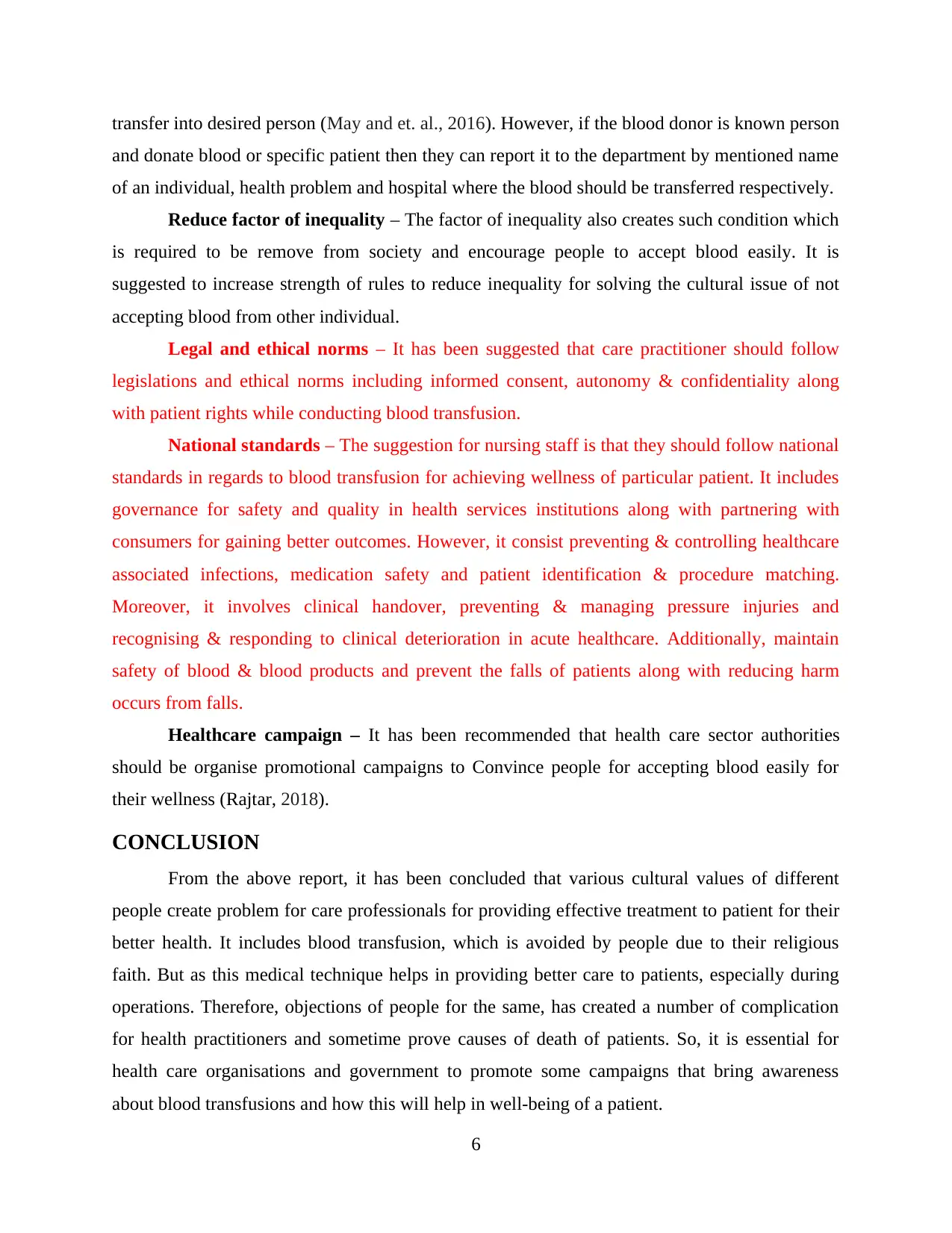
transfer into desired person (May and et. al., 2016). However, if the blood donor is known person
and donate blood or specific patient then they can report it to the department by mentioned name
of an individual, health problem and hospital where the blood should be transferred respectively.
Reduce factor of inequality – The factor of inequality also creates such condition which
is required to be remove from society and encourage people to accept blood easily. It is
suggested to increase strength of rules to reduce inequality for solving the cultural issue of not
accepting blood from other individual.
Legal and ethical norms – It has been suggested that care practitioner should follow
legislations and ethical norms including informed consent, autonomy & confidentiality along
with patient rights while conducting blood transfusion.
National standards – The suggestion for nursing staff is that they should follow national
standards in regards to blood transfusion for achieving wellness of particular patient. It includes
governance for safety and quality in health services institutions along with partnering with
consumers for gaining better outcomes. However, it consist preventing & controlling healthcare
associated infections, medication safety and patient identification & procedure matching.
Moreover, it involves clinical handover, preventing & managing pressure injuries and
recognising & responding to clinical deterioration in acute healthcare. Additionally, maintain
safety of blood & blood products and prevent the falls of patients along with reducing harm
occurs from falls.
Healthcare campaign – It has been recommended that health care sector authorities
should be organise promotional campaigns to Convince people for accepting blood easily for
their wellness (Rajtar, 2018).
CONCLUSION
From the above report, it has been concluded that various cultural values of different
people create problem for care professionals for providing effective treatment to patient for their
better health. It includes blood transfusion, which is avoided by people due to their religious
faith. But as this medical technique helps in providing better care to patients, especially during
operations. Therefore, objections of people for the same, has created a number of complication
for health practitioners and sometime prove causes of death of patients. So, it is essential for
health care organisations and government to promote some campaigns that bring awareness
about blood transfusions and how this will help in well-being of a patient.
6
and donate blood or specific patient then they can report it to the department by mentioned name
of an individual, health problem and hospital where the blood should be transferred respectively.
Reduce factor of inequality – The factor of inequality also creates such condition which
is required to be remove from society and encourage people to accept blood easily. It is
suggested to increase strength of rules to reduce inequality for solving the cultural issue of not
accepting blood from other individual.
Legal and ethical norms – It has been suggested that care practitioner should follow
legislations and ethical norms including informed consent, autonomy & confidentiality along
with patient rights while conducting blood transfusion.
National standards – The suggestion for nursing staff is that they should follow national
standards in regards to blood transfusion for achieving wellness of particular patient. It includes
governance for safety and quality in health services institutions along with partnering with
consumers for gaining better outcomes. However, it consist preventing & controlling healthcare
associated infections, medication safety and patient identification & procedure matching.
Moreover, it involves clinical handover, preventing & managing pressure injuries and
recognising & responding to clinical deterioration in acute healthcare. Additionally, maintain
safety of blood & blood products and prevent the falls of patients along with reducing harm
occurs from falls.
Healthcare campaign – It has been recommended that health care sector authorities
should be organise promotional campaigns to Convince people for accepting blood easily for
their wellness (Rajtar, 2018).
CONCLUSION
From the above report, it has been concluded that various cultural values of different
people create problem for care professionals for providing effective treatment to patient for their
better health. It includes blood transfusion, which is avoided by people due to their religious
faith. But as this medical technique helps in providing better care to patients, especially during
operations. Therefore, objections of people for the same, has created a number of complication
for health practitioners and sometime prove causes of death of patients. So, it is essential for
health care organisations and government to promote some campaigns that bring awareness
about blood transfusions and how this will help in well-being of a patient.
6
⊘ This is a preview!⊘
Do you want full access?
Subscribe today to unlock all pages.

Trusted by 1+ million students worldwide

7
Paraphrase This Document
Need a fresh take? Get an instant paraphrase of this document with our AI Paraphraser
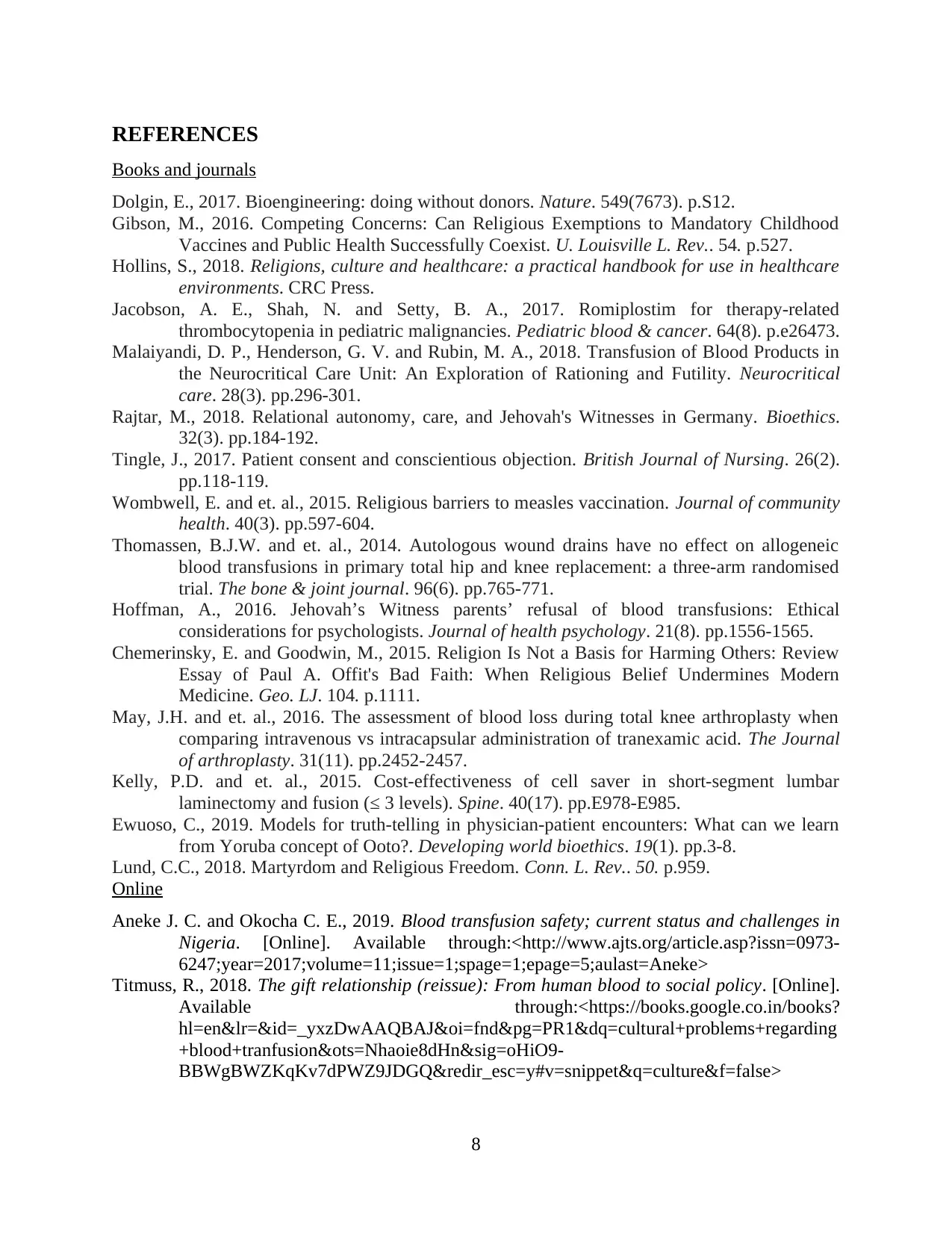
REFERENCES
Books and journals
Dolgin, E., 2017. Bioengineering: doing without donors. Nature. 549(7673). p.S12.
Gibson, M., 2016. Competing Concerns: Can Religious Exemptions to Mandatory Childhood
Vaccines and Public Health Successfully Coexist. U. Louisville L. Rev.. 54. p.527.
Hollins, S., 2018. Religions, culture and healthcare: a practical handbook for use in healthcare
environments. CRC Press.
Jacobson, A. E., Shah, N. and Setty, B. A., 2017. Romiplostim for therapy‐related
thrombocytopenia in pediatric malignancies. Pediatric blood & cancer. 64(8). p.e26473.
Malaiyandi, D. P., Henderson, G. V. and Rubin, M. A., 2018. Transfusion of Blood Products in
the Neurocritical Care Unit: An Exploration of Rationing and Futility. Neurocritical
care. 28(3). pp.296-301.
Rajtar, M., 2018. Relational autonomy, care, and Jehovah's Witnesses in Germany. Bioethics.
32(3). pp.184-192.
Tingle, J., 2017. Patient consent and conscientious objection. British Journal of Nursing. 26(2).
pp.118-119.
Wombwell, E. and et. al., 2015. Religious barriers to measles vaccination. Journal of community
health. 40(3). pp.597-604.
Thomassen, B.J.W. and et. al., 2014. Autologous wound drains have no effect on allogeneic
blood transfusions in primary total hip and knee replacement: a three-arm randomised
trial. The bone & joint journal. 96(6). pp.765-771.
Hoffman, A., 2016. Jehovah’s Witness parents’ refusal of blood transfusions: Ethical
considerations for psychologists. Journal of health psychology. 21(8). pp.1556-1565.
Chemerinsky, E. and Goodwin, M., 2015. Religion Is Not a Basis for Harming Others: Review
Essay of Paul A. Offit's Bad Faith: When Religious Belief Undermines Modern
Medicine. Geo. LJ. 104. p.1111.
May, J.H. and et. al., 2016. The assessment of blood loss during total knee arthroplasty when
comparing intravenous vs intracapsular administration of tranexamic acid. The Journal
of arthroplasty. 31(11). pp.2452-2457.
Kelly, P.D. and et. al., 2015. Cost-effectiveness of cell saver in short-segment lumbar
laminectomy and fusion (≤ 3 levels). Spine. 40(17). pp.E978-E985.
Ewuoso, C., 2019. Models for truth‐telling in physician‐patient encounters: What can we learn
from Yoruba concept of Ooto?. Developing world bioethics. 19(1). pp.3-8.
Lund, C.C., 2018. Martyrdom and Religious Freedom. Conn. L. Rev.. 50. p.959.
Online
Aneke J. C. and Okocha C. E., 2019. Blood transfusion safety; current status and challenges in
Nigeria. [Online]. Available through:<http://www.ajts.org/article.asp?issn=0973-
6247;year=2017;volume=11;issue=1;spage=1;epage=5;aulast=Aneke>
Titmuss, R., 2018. The gift relationship (reissue): From human blood to social policy. [Online].
Available through:<https://books.google.co.in/books?
hl=en&lr=&id=_yxzDwAAQBAJ&oi=fnd&pg=PR1&dq=cultural+problems+regarding
+blood+tranfusion&ots=Nhaoie8dHn&sig=oHiO9-
BBWgBWZKqKv7dPWZ9JDGQ&redir_esc=y#v=snippet&q=culture&f=false>
8
Books and journals
Dolgin, E., 2017. Bioengineering: doing without donors. Nature. 549(7673). p.S12.
Gibson, M., 2016. Competing Concerns: Can Religious Exemptions to Mandatory Childhood
Vaccines and Public Health Successfully Coexist. U. Louisville L. Rev.. 54. p.527.
Hollins, S., 2018. Religions, culture and healthcare: a practical handbook for use in healthcare
environments. CRC Press.
Jacobson, A. E., Shah, N. and Setty, B. A., 2017. Romiplostim for therapy‐related
thrombocytopenia in pediatric malignancies. Pediatric blood & cancer. 64(8). p.e26473.
Malaiyandi, D. P., Henderson, G. V. and Rubin, M. A., 2018. Transfusion of Blood Products in
the Neurocritical Care Unit: An Exploration of Rationing and Futility. Neurocritical
care. 28(3). pp.296-301.
Rajtar, M., 2018. Relational autonomy, care, and Jehovah's Witnesses in Germany. Bioethics.
32(3). pp.184-192.
Tingle, J., 2017. Patient consent and conscientious objection. British Journal of Nursing. 26(2).
pp.118-119.
Wombwell, E. and et. al., 2015. Religious barriers to measles vaccination. Journal of community
health. 40(3). pp.597-604.
Thomassen, B.J.W. and et. al., 2014. Autologous wound drains have no effect on allogeneic
blood transfusions in primary total hip and knee replacement: a three-arm randomised
trial. The bone & joint journal. 96(6). pp.765-771.
Hoffman, A., 2016. Jehovah’s Witness parents’ refusal of blood transfusions: Ethical
considerations for psychologists. Journal of health psychology. 21(8). pp.1556-1565.
Chemerinsky, E. and Goodwin, M., 2015. Religion Is Not a Basis for Harming Others: Review
Essay of Paul A. Offit's Bad Faith: When Religious Belief Undermines Modern
Medicine. Geo. LJ. 104. p.1111.
May, J.H. and et. al., 2016. The assessment of blood loss during total knee arthroplasty when
comparing intravenous vs intracapsular administration of tranexamic acid. The Journal
of arthroplasty. 31(11). pp.2452-2457.
Kelly, P.D. and et. al., 2015. Cost-effectiveness of cell saver in short-segment lumbar
laminectomy and fusion (≤ 3 levels). Spine. 40(17). pp.E978-E985.
Ewuoso, C., 2019. Models for truth‐telling in physician‐patient encounters: What can we learn
from Yoruba concept of Ooto?. Developing world bioethics. 19(1). pp.3-8.
Lund, C.C., 2018. Martyrdom and Religious Freedom. Conn. L. Rev.. 50. p.959.
Online
Aneke J. C. and Okocha C. E., 2019. Blood transfusion safety; current status and challenges in
Nigeria. [Online]. Available through:<http://www.ajts.org/article.asp?issn=0973-
6247;year=2017;volume=11;issue=1;spage=1;epage=5;aulast=Aneke>
Titmuss, R., 2018. The gift relationship (reissue): From human blood to social policy. [Online].
Available through:<https://books.google.co.in/books?
hl=en&lr=&id=_yxzDwAAQBAJ&oi=fnd&pg=PR1&dq=cultural+problems+regarding
+blood+tranfusion&ots=Nhaoie8dHn&sig=oHiO9-
BBWgBWZKqKv7dPWZ9JDGQ&redir_esc=y#v=snippet&q=culture&f=false>
8
1 out of 11
Related Documents
Your All-in-One AI-Powered Toolkit for Academic Success.
+13062052269
info@desklib.com
Available 24*7 on WhatsApp / Email
![[object Object]](/_next/static/media/star-bottom.7253800d.svg)
Unlock your academic potential
Copyright © 2020–2025 A2Z Services. All Rights Reserved. Developed and managed by ZUCOL.





